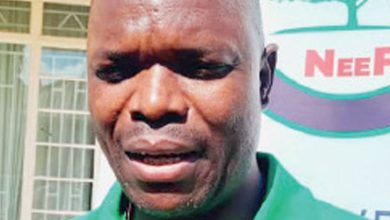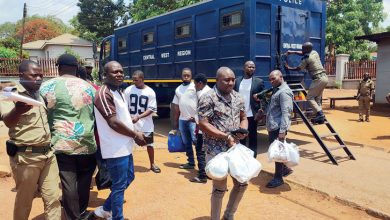Mining haunted by exploitation, dubious contracts
In the gold-rich fields of Kasungu Districts, villagers dig with bare hands in collapsing tunnels, risking death for a few grammes of gold.
Women cook over smoky fires and children fetch water while men pound rocks under the blazing sun.
On September 30, eight miners died after an artisanal shaft collapsed. Several others were reported injured.
While communities mourn, the government’s gold buying initiative touted as a solution to smuggling has descended into secrecy.
Missing figures, shadowy contracts and a complete absence of accountability now define a programme once pitched as a beacon of reform.
For four weeks, The Nation visited mining sites, interviewed miners, traditional leaders, dealers, civil society actors and reviewed official records.
Requests for comment from the Reserve Bank of Malawi (RBM), the Ministry of Mining, the Malawi Environmental Protection Authority (Mepa) and Kasungu District Council have yielded no response.
Even formal requests under the Access to Information Act went unanswered, an indictment of the entrenched secrecy within Malawi’s mining sector, making a mockery of outgoing President Lazarus Chakwera’s repeated calls for transparency.
Elites in the shadows, villagers in death traps

Mafuta-Mwale. | Nation
In Traditional Authority (T/A) Chitantha-Mapiri, gold fields stretch across land three times the size of a football pitch.
Heavy machinery, gold mills and transport trucks dominate the landscape—none of it owned by local villagers.
Interviews revealed that politically-exposed persons (PEPs), business elites and foreign nationals are the true beneficiaries.
Harold Bisalomu, a licensed artisanal miner, confirmed that he works as an agent for powerful figures.
“This is business for big boys,” he said, declining to name them.
Sources identified individuals linked to former presidents, vice-presidents, former Cabinet ministers, legislators and foreign nationals as hidden operators.
The presence of industrial-scale machinery contradicts the government’s claim that gold mining is artisanal and small-scale.
Inconsistent records, foreign deals and gold lost.
In 2021, the Export Development Fund (EDF), owned by RBM, launched the Gold Buying Initiative aimed to curb smuggling by purchasing gold directly from small-scale miners.
The initiative followed Chakwera’s 2020 State of the Nation Address in which he revealed that $85 million (at least K150 billion) worth of gold was being smuggled annually to the United Arab Emirates.
To attract sellers, government raised the buying price dramatically from between K40 000 and K50 000 per gramme in 2021 to between K390 000 and K400 000 per gramme by 2025, an increase of nearly 900 percent.
The seventh edition of the Malawi Extractive Industry Transparency Initiative (Mweiti) report released this year confirmed that the price hikes triggered a 70 percent rise in gold purchases.
“One of the major reasons is that the price increase in gold, which resulted in an increase in purchases from 4 kilogrammes [kg] to 10kg a week,” the report noted.
However, public records on gold remain riddled with contradictions. If RBM purchases 10kg weekly, as claimed, that translates to 40kg monthly or about 480kg annually.
RBM records, as reflected in the 2025 Malawi Government Annual Economic Report, indicate that only 293kg were purchased in 2024, at a cost of K34 billion—equivalent to around four kg weekly. Even more puzzling, Chakwera told Parliament in February 2025 that RBM had purchased just 187kg worth K19.2 billion.
The Nation investigation confirmed that foreign nationals, including some from neighbouring countries, are exploiting Malawi’s higher gold prices while simultaneously smuggling out the metal.
A parallel industry of gold smelters has quietly flourished in Lilongwe, their origins and regulation shrouded in secrecy. Informants, including dealers and government officials, cited at least four smelting shops, all run by foreigners.
We independently confirmed two: one Israeli-owned smelter near Kamuzu International Airport and another operated by a Zambian in Lilongwe’s City Centre.
According to a government official, RBM takes its gold to the Israeli facility. Dealers and workers at the smelters also alleged that these shops refine far more gold daily than is officially recorded.
Chakwera himself confirmed in Parliament that RBM was working with a “local gold refining company” located near the airport.
“RBM is now at a stage where the gold will be purified to the said grade at the end of the first quarter of 2024,” he told legislators.
But a senior Treasury official, speaking on condition of anonymity, said the gold buying initiative has only worsened smuggling, with about K500 billion worth of the metal leaving Malawi illegally every year.
The figure, he said, came from a recent survey by the Malawi Mining Company (Mamico), but has been suppressed “because it is embarrassingly revealing”.
In the 2025-2026 National Budget statement presented in Parliament in February this year, it was announced that Mamico would do a nationwide survey to identify and assess gold mining sites to inform strategic investment.
We sent questionnaires to Mamico director general Leonard Kalindekafe, Mining Authority director general Samuel Sakhuta and Ministry of Mining Principal Secretary Martin Kaluluma, but got no response since July.
Repeated efforts to obtain comment from RBM also proved fruitless as since July 1 2025, RBM spokesperson Boston Maliketi Banda has deflected enquiries, citing clearance delays.
On July 8, he assured: “I worked on a comprehensive write-up of the gold purchase programme and will circulate [it] to the media.”
Days later, he promised updated responses. None arrived.
RBM Governor Macdonald Mafuta Mwale, contacted directly last week, pledged to respond by close of business the following day. However, the response is yet to come.
According to the Annual Economic Report, informal gold mining hotspots include Kasungu, Balaka, Lisungwi in Neno, Nsanama in Machinga, Makanjira in Mangochi, Tukombo in Nkhata Bay and Bowa, Dwangwa and surrounding areas in Nkhotakota.





